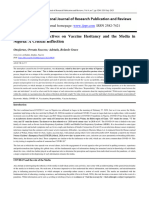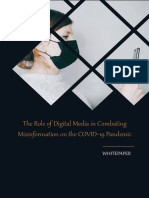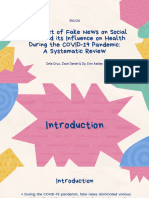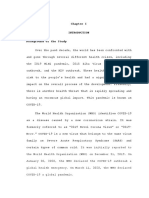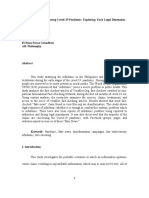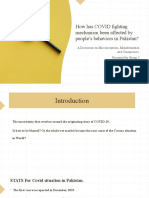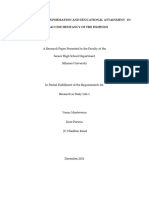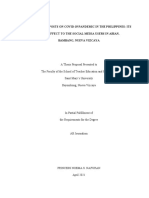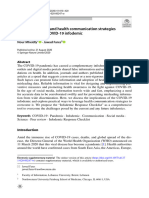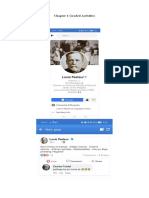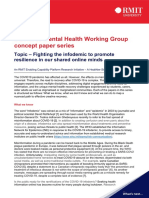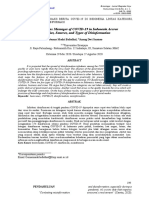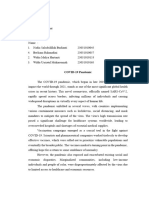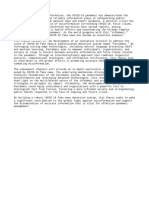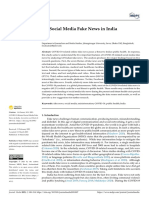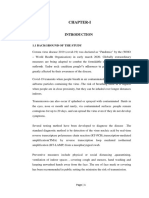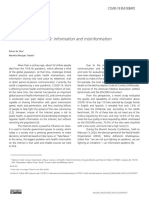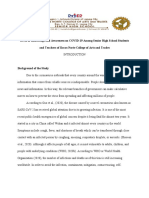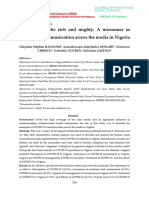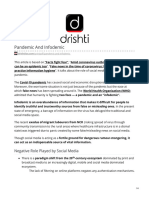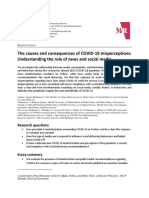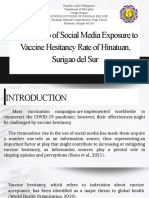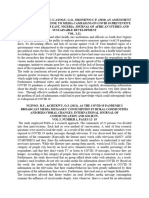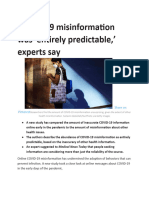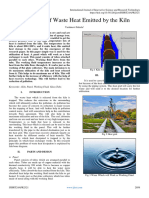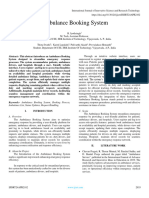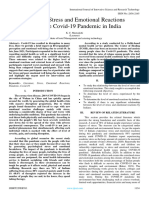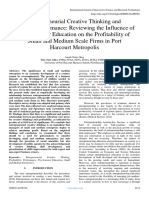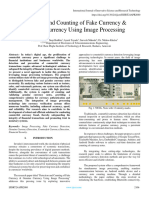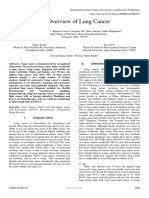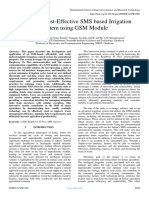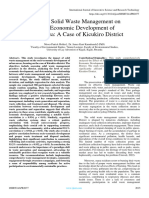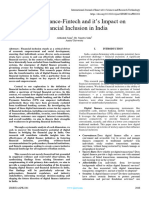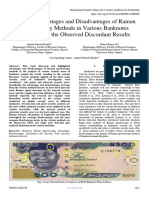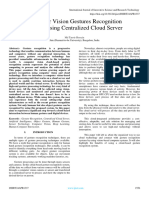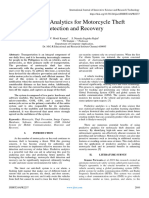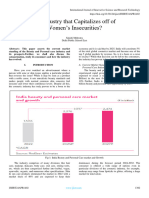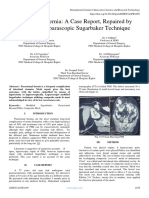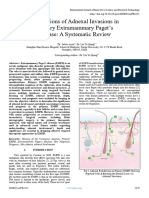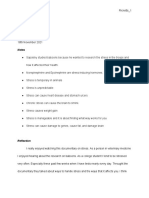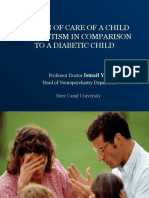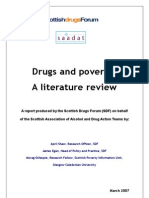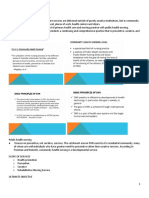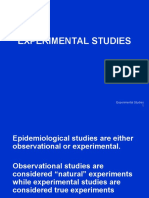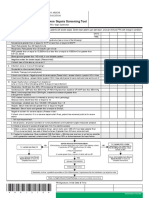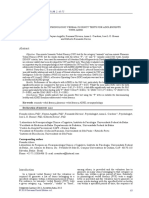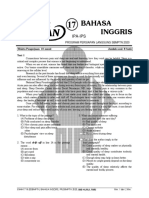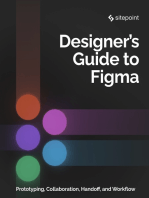Professional Documents
Culture Documents
Mapping Fake News Misinformation and Health Communication Gaps in The Wake of Covid-19 Pandemic in Nigeria
Original Title
Copyright
Available Formats
Share this document
Did you find this document useful?
Is this content inappropriate?
Report this DocumentCopyright:
Available Formats
Mapping Fake News Misinformation and Health Communication Gaps in The Wake of Covid-19 Pandemic in Nigeria
Copyright:
Available Formats
Volume 8, Issue 5, May – 2023 International Journal of Innovative Science and Research Technology
ISSN No:-2456-2165
Mapping Fake News Misinformation and Health
Communication Gaps in the Wake of Covid-19
Pandemic in Nigeria
Samson Ighiegba Omosotomhe1 Wilfred Oritsesan Olley2
1 2
Department of Mass Communication, Auchi Polytechnic, Department of Mass Communication, Edo State University
Auchi – Nigeria Uzairue – Nigeria
Abstract:- The Covid-19 pandemic has changed the way misinformation are shared and disseminated in Nigeria in
the world communicates, particularly in Nigeria with its order to design effective countermeasures. This paper will
high prevalence of fake news and misinformation. This discuss how to map fake news, misinformation and health
study aims to map the fake news, misinformation and communication gaps in Nigeria in the wake of the Covid-19
health communication gaps in the wake of the Covid-19 pandemic.
pandemic in Nigeria through the use of mixed method
data. A combination of qualitative and quantitative data The Covid-19 pandemic has resulted in an increased
collection methods was used to explore the sources of fake need for mapping fake news, misinformation and health
news and misinformation, the mediums through which it communication gaps in Nigeria. It is essential to understand
is shared and the impact on health communication. the local context and identify the sources of fake news and
Survey was conducted to collect quantitative data on the misinformation in order to design effective countermeasures.
prevalence of fake news in Nigeria. Qualitative interviews Additionally, it is important to understand the health
will be conducted to gain a better understanding of the communication gaps in Nigeria and design campaigns and
context and motivations driving the spread of interventions to address them. By understanding the local
misinformation. Findings revealed that the lack of access context and identifying the sources of fake news and
to reliable health information and services has further misinformation, it is possible to design effective
exacerbated the spread of misinformation and has made countermeasures to combat the spread of fake news and
it difficult for citizens to make informed decisions about misinformation in Nigeria.
their health and safety. The study recommends amongst
others that; the government should ensure that accurate The Covid-19 pandemic has led to a surge in
health information is made available to the public misinformation about the virus and its effects, making it
through effective health communication strategies, that difficult for people to access reliable health information. In
the government should also ensure that all stakeholders Nigeria, the prevalence of fake news, misinformation, and
are involved in the development of health communication health communication gaps has become increasingly
strategies, so that all views are heard and taken into problematic in the wake of the Covid-19 pandemic. Fake
consideration. news is defined as false information or hoaxes spread
intentionally and maliciously, often to further political,
Keywords:- Fake News, Misinformation, Health ideological, or financial interests (Gans, 2020).
Communication, COVID-19, Nigeria. Misinformation is false information spread unintentionally,
often through ignorance or misunderstanding (Gans, 2020).
I. INTRODUCTION The goal of this study is to map the prevalence of fake news
and misinformation in relation to Covid-19 in Nigeria, as
The COVID-19 pandemic has impacted the lives of well as to identify any health communication gaps that may
people around the world in unprecedented ways. In the wake exist. This mapping will be conducted by analyzing data
of the pandemic, the spread of misinformation and fake news from news reports, social media, and other sources in order to
has become a major concern. In Nigeria, the pandemic has determine the prevalence of fake news and misinformation in
caused a significant increase in the spread of misinformation. Nigeria. Additionally, interviews and surveys will be
This has made it difficult for people to access reliable health conducted to identify any health communication gaps that
information and has also caused confusion over the best may exist. The results of this study will be used to inform
measures to take to protect oneself and others from the virus. health communication strategies in Nigeria, in order to ensure
that the public has access to reliable and accurate information
Due to the outbreak of the Covid-19 pandemic, there about the Covid-19 pandemic.
has been an increased need for mapping fake news,
misinformation and health communication gaps in Nigeria. Fake news, misinformation, and health communication
Fake news and misinformation are a global issue and have gaps have been international issues that have been growing in
recently been a topic of discussion in Nigeria. These false prevalence over the past few years. However, the pandemic
and misleading statements distort the public’s perception of of Covid-19 has further highlighted the need to address these
the pandemic and thus, interfere with the efforts to contain issues. The Covid-19 pandemic has caused a rapid spread of
the virus. It is essential to understand how fake news and information, some of it true and some of it fake, which has
IJISRT23MAY2107 www.ijisrt.com 1467
Volume 8, Issue 5, May – 2023 International Journal of Innovative Science and Research Technology
ISSN No:-2456-2165
led to a great amount of confusion, fear, and anxiety among they are exposed to. Fake news, misinformation, and health
the public. This has led to the need to understand how fake communication gaps have emerged as serious issues in the
news, misinformation, and health communication gaps are wake of the Covid-19 pandemic.
impacting the public's response to the pandemic and to
develop strategies to combat them. This essay aims to discuss First, fake news has become a major source of concern
the importance of mapping fake news, misinformation, and in the wake of the Covid-19 pandemic. Fake news is defined
health communication gaps in the wake of the Covid-19 as false or inaccurate information that is spread via online
pandemic. platforms and websites (Giles, 2020). Since the onset of the
pandemic, individuals have been exposed to false claims
It is important to understand the definition of fake news about the virus, such as its origin and the effectiveness of
and misinformation. Fake news is defined as any type of false various treatments and vaccines. These false claims have
or misleading information, or news, that is spread caused confusion and delayed the implementation of
intentionally with the intention of misinforming the public or effective public health measures.
causing confusion (Vosoughi, Roy, & Aral, 2018).
Misinformation, on the other hand, is defined as any type of Second, the spread of misinformation has been a major
false or misleading information that is spread unintentionally, issue during the Covid-19 pandemic. Misinformation is
or without the intention of causing confusion or defined as false or inaccurate information that is spread
misinforming the public (Vosoughi, Roy, & Aral, 2018). It is unintentionally (Giles, 2020). During the pandemic,
important to note that both of these concepts can have severe individuals have been exposed to misleading information
impacts on the public's understanding of issues, such as the about the virus, such as its origin and the effectiveness of
Covid-19 pandemic, and can lead to confusion and anxiety. various treatments and vaccines. This has led to confusion
and fear among the public.
Again, one needs to understand the impact of fake news
and misinformation on the public's response to the Covid-19 Third, health communication gaps have emerged as a
pandemic. Fake news and misinformation can lead to serious problem during the Covid-19 pandemic. Health
confusion and fear, which can lead to a lack of understanding communication gaps refer to the lack of accurate and timely
of the virus, the need for social distancing, and the need for communication of health information to the public (Giles,
other preventative measures (Chen & Chen, 2020). This can 2020). During the pandemic, health information has been
lead to the public not following the necessary preventative slow to reach vulnerable populations, such as the elderly and
measures and, in turn, an increased spread of the virus. those living in rural areas. This has led to a lack of
Additionally, fake news and misinformation can lead to a understanding of the virus and the measures that should be
lack of trust in public health officials and government taken to protect oneself.
measures, further leading to a lack of adherence to
preventative measures (Chen & Chen, 2020). The Covid-19 pandemic has posed serious challenges in
terms of fake news, misinformation, and health
It is germane to understand the need for mapping fake communication gaps. It is essential to map these issues in
news, misinformation, and health communication gaps in the order to identify and address them effectively. This will help
wake of the Covid-19 pandemic. Mapping fake news and ensure the public has access to accurate and timely
misinformation can help to identify the sources of false information about the virus and the measures that should be
information and the channels through which it is spread. This taken to protect oneself.
can help to identify trends in the spread of fake news and
misinformation and inform strategies to combat it. Research Objectives:
Additionally, mapping health communication gaps can help To analyse the prevalence of fake news, misinformation
to identify areas in which there is a lack of accurate and and health communication gaps in the context of Covid-
reliable information and help to inform the development of 19 pandemic in Nigeria.
strategies to bridge these gaps. To identify the primary sources of fake news,
misinformation and health communication gaps in
Fake news, misinformation, and health communication Nigeria.
gaps have been a growing problem for some time. However, To explore the impact of fake news, misinformation and
the Covid-19 pandemic has highlighted the need to address health communication gaps on the health behaviours of
these issues. Mapping fake news, misinformation, and health Nigerians.
communication gaps is an important step in understanding To examine the strategies adopted by the Nigerian
the impact of these issues and developing strategies to government to counter fake news, misinformation and
address them. health communication gaps.
Statement of the Problem Research Questions:
The Covid-19 pandemic has created a health crisis of What is the prevalence of fake news, misinformation and
unprecedented proportions. With the spread of the virus, health communication gaps in Nigeria regarding Covid-
there has been an abundance of information available on the 19 pandemic?
internet. Consequently, it has become difficult for individuals
to determine the accuracy and validity of the information
IJISRT23MAY2107 www.ijisrt.com 1468
Volume 8, Issue 5, May – 2023 International Journal of Innovative Science and Research Technology
ISSN No:-2456-2165
What are the primary sources of fake news, health information. This type of misinformation can lead to
misinformation and health communication gaps in confusion and distrust of health information, which can lead
Nigeria? to a lack of trust in the health care system (Chen, 2020).
What is the impact of fake news, misinformation and Additionally, misinformation can lead to health disparities, as
health communication gaps on the health behaviors of people with limited access to accurate health information are
Nigerians? more likely to be affected by misinformation (Hoffman,
What strategies are adopted by the Nigerian government 2019).
to counter the spread of fake news, misinformation and
health communication gaps? Health communication gaps can lead to a lack of
understanding of health information, which can lead to a lack
II. LITERATURE REVIEW of trust in the health care system. These communication gaps
can be caused by a lack of access to accurate information, a
A. Understanding Fake News lack of understanding of health information, or even a lack of
Fake news is a term used to describe false or misleading trust in the health care system (Chen, 2020). Additionally,
information presented as news. It has become a major communication gaps can lead to health disparities, as people
problem in the digital age, as it has the potential to spread with limited access to accurate health information are more
quickly and cause confusion and harm. According to the likely to be affected by misinformation (Hoffman, 2019).
Oxford English Dictionary, “Fake news” is defined as “false,
often sensational, information disseminated under the guise Furthermore, health communication gaps can lead to a
of news reporting” (Oxford English Dictionary, n.d.). The lack of education and understanding of health information,
term has become increasingly popular in recent years and is which can lead to a lack of trust in the health care system.
often used to refer to any type of false or misleading People with limited access to accurate health information are
information, whether it is deliberately created or presented as more likely to be affected by misinformation, and thus, may
fact. Fake news can take many different forms, from not be able to make informed decisions about their health
fabricated stories to biased reporting. One common form of (Hoffman, 2019). Additionally, people with limited access to
fake news is the “clickbait” headline, which is designed to accurate health information may not be able to trust that the
draw attention and clicks with a provocative headline, but the information they are receiving is accurate (Chen, 2020).
content of the article does not necessarily reflect the headline.
Additionally, fake news can be spread through social media Additionally, health communication gaps can lead to a
by bots and trolls who have the intention of manipulating lack of access to accurate health information, which can lead
public opinion. to a lack of trust in the health care system. People with
limited access to accurate health information may not be able
The prevalence of fake news has led to a great deal of to trust the health care system, as they may not be able to
debate about how to tackle the issue. Some believe that it is access accurate information about their health (Hoffman,
the responsibility of media outlets to ensure the accuracy of 2019). Furthermore, people with limited access to accurate
their reporting, while others argue that it is the responsibility health information may not be able to make informed
of the individual to verify the accuracy of the information decisions about their health (Chen, 2020).
they consume. Additionally, some argue that governments
should do more to regulate the media and ensure that only Health communication gaps can also lead to health
accurate information is reported. The effects of fake news can disparities, as people with limited access to accurate health
be far-reaching and severe. It can lead to political unrest, information are more likely to be affected by misinformation
confusion and distrust in the media, and even public health (Hoffman, 2019). This can lead to a lack of trust in the health
crises. It is therefore important that individuals, media care system, as people may not be able to trust that the
outlets, and governments take steps to combat the spread of information, they are receiving is accurate (Chen, 2020).
fake news and ensure that accurate information is Additionally, health disparities can lead to a lack of
disseminated. understanding of the importance of health information, which
can lead to a lack of trust in the health care system (Hoffman,
Fake news is a term used to describe false or misleading 2019).
information presented as news. It is a major problem in the
digital age, as it has the potential to spread quickly and cause In order to address the issue of health communication
confusion and harm. It is therefore important that individuals, gaps, it is important to ensure that everyone has access to
media outlets, and governments take steps to combat the accurate health information. This can be done by providing
spread of fake news and ensure that accurate information is access to reliable sources of health information, such as
disseminated. health websites, health professionals, and health care centers
(Chen, 2020). Additionally, it is important to ensure that
B. Misinformation and Health Communication Gaps everyone is able to understand health information, which can
Misinformation is a major issue in health be done by providing educational materials and resources to
communication today, as it can lead to health-related help people understand the importance of health information
outcomes that are not based on accurate information. (Hoffman, 2019).
Misinformation can come from various sources, including
social media, health professionals, and other sources of
IJISRT23MAY2107 www.ijisrt.com 1469
Volume 8, Issue 5, May – 2023 International Journal of Innovative Science and Research Technology
ISSN No:-2456-2165
Overall, misinformation and health communication fundraising campaigns and to spread the word about the
gaps can lead to a lack of trust in the health care system, various initiatives. This has been of great help in supporting
health disparities, and a lack of understanding of health those who are in need and to fight the spread of the virus
information. In order to address this issue, it is important to (Olivier, 2020). Social media has been an invaluable tool
ensure that everyone has access to accurate health during the Covid-19 pandemic. It has enabled people to stay
information, as well as educational materials and resources to connected, informed, and supported. It has also enabled
help people understand the importance of health information organizations to communicate better with their customers and
(Chen, 2020; Hoffman, 2019). This can help to ensure that stakeholders. Moreover, it has been used to raise funds and
everyone is able to make informed decisions about their awareness for different causes related to the pandemic.
health.
D. Impact of Covid-19
C. The Role of Social Media The novel Coronavirus (COVID-19) has had a
Social media is defined as “digital media technologies devastating and far-reaching impact on Nigerians, both
and online platforms that facilitate the creation, sharing, and domestically and economically. The pandemic has had a
exchange of user-generated content, such as photos, videos, devastating effect on the Nigerian economy, as the World
text, and other forms of media” (Gentile, 2018, p. 2). This Bank has estimated that Nigeria’s gross domestic product
type of media has become increasingly popular in recent (GDP) could shrink by as much as 5.4% in 2020.
years and is used for a variety of purposes, including (Ebunoluwa, 2020). This has had a severe impact on the lives
communication, advertising, and entertainment (Zhang, Sun of many Nigerians, who are already struggling with the
& Sundar, 2013). economic downturn, and has made them even more
vulnerable to poverty and hunger. The pandemic has also had
The Covid-19 pandemic has drastically changed the a direct impact on the Nigerian health system, as the country
way people interact with each other and how they obtain has reported over 1.5 million cases of COVID-19 and nearly
information. Social media has become an essential platform 20,000 deaths. (Nigeria Centre for Disease Control, 2021).
for people to connect, find news, and share their experiences This has put a strain on the health system, as there is a
with the virus. Social media has been a lifeline for many shortage of medical supplies and personnel, as well as a lack
during the pandemic, providing an avenue for people to of infrastructure to adequately respond to the pandemic. This
express their feelings and to support each other in these has caused a significant disruption to the health system,
difficult times (Cheung & Lee, 2020). Social media offers an making it difficult to provide adequate healthcare to those
accessible and convenient platform for people to stay affected.
connected and engaged in matters concerning the global
pandemic. It has allowed individuals to access reliable and The pandemic has also had an impact on the Nigerian
timely news and updates. This has enabled people to stay education system, as schools and universities have been
informed about the virus and its implications (Giannaoui, closed since March 2020. (Oyeyemi, 2020). This has had an
Abel, & Brouard, 2020). adverse effect on learning and has led to a disruption in the
education system, resulting in an increase in the number of
Social media has also had a positive impact on helping out-of-school children, as well as a decrease in the quality of
individuals cope with the stress and anxiety associated with education. Additionally, the pandemic has had a negative
the pandemic. It has provided a platform for people to effect on the Nigerian labor market, as the unemployment
connect, share stories, and offer emotional support to each rate has increased from 18.8% in the fourth quarter of 2019
other. It has enabled people to maintain social connections to over 27% in the fourth quarter of 2020. (National Bureau
while still adhering to physical distancing guidelines (Olivier, of Statistics, 2020). This has had a significant impact on the
2020). In addition, social media has been used by livelihoods of many Nigerians, as the labor market has
organizations to disseminate information and create become increasingly competitive and underemployment has
awareness about the virus. Different organizations have used become more widespread. The pandemic has also had a
social media to share information about the virus, its major impact on the Nigerian economy, as the government
symptoms, and precautionary measures. This has enabled has implemented a series of austerity measures to help
many people to stay informed and be proactive in taking the stabilize the economy. These austerity measures have
necessary steps to prevent the spread of the virus (Cheung & included cuts to public spending, increases in taxes, and an
Lee, 2020). increase in the central bank’s interest rate. (Nigerian
Investment Promotion Commission, 2021). These measures
Social media has also been instrumental in helping have had an adverse effect on the economy, as they have led
organizations to better manage their communication with to a decrease in consumer spending and investment, resulting
their customers and stakeholders. Companies have used in a decrease in economic growth.
social media to communicate their business continuity plans
and to provide updates about their operations during the Furthermore, the pandemic has had a significant impact
pandemic. This has enabled organizations to maintain trust on the Nigerian banking system, as banks have been forced to
and transparency with their customers (Giannaoui, Abel, & limit their operations in order to comply with safety
Brouard, 2020). Furthermore, social media has also been protocols. This has led to a decrease in the availability of
used to raise funds and awareness for different causes related banking services, as banks have reduced the availability of
to the pandemic. It has enabled people to engage in loans and other services. In addition, the government has
IJISRT23MAY2107 www.ijisrt.com 1470
Volume 8, Issue 5, May – 2023 International Journal of Innovative Science and Research Technology
ISSN No:-2456-2165
implemented a number of measures to help stabilize the pandemic in Nigeria. This theory, developed by Hochbaum,
banking system, including reducing the Central Bank of Rosenstock, and Kegels, suggests that people's health-related
Nigeria’s interest rate and introducing a bank recapitalization behaviours are determined by their perceived susceptibility to
plan. (Central Bank of Nigeria, 2021). The pandemic has had and severity of an illness, their perceived benefits and
a major impact on the Nigerian agricultural sector, as the barriers to engaging in preventive health behaviours, and
sector has been severely affected by the pandemic. This has their self-efficacy (Hochbaum et al., 1958). In the case of the
been due to a decrease in demand for agricultural products, as Covid-19 pandemic, Nigerians' perceived susceptibility to the
well as a decrease in access to markets and supply chains. virus and their perceived benefits and barriers to engaging in
The agricultural sector has also been adversely affected by preventive health behaviours may be influencing how they
the government’s austerity measures, as the government has receive, process, and act on information about it. The model
cut subsidies and increased taxes on agricultural products. suggests that an individual’s health beliefs and behaviours are
(Oke, 2020). The pandemic has also had a major impact on determined by their perceived susceptibility to a health risk,
the Nigerian energy sector, as the sector has been severely perceived severity of the health risk, perceived benefits of
affected by the pandemic. This has been due to the decrease taking action to reduce the health risk, and perceived barriers
in demand for energy, as well as a decrease in access to to taking action (Rosenstock, Strecher, & Becker, 1988).
markets and supply chains. Additionally, the government has
implemented a number of measures to help stabilize the In the wake of the Covid-19 pandemic in Nigeria,
energy sector, including reducing taxes and increasing the mapping the fake news, misinformation and health
availability of financing. (Nigerian Electricity Regulatory communication gaps has become increasingly important.
Commission, 2021). Fake news and misinformation have been rampant during the
pandemic, leading to confusion and increased risk of
Furthermore, the pandemic has had a major impact on exposure to the virus. In order to address this problem, the
the Nigerian transport sector, as the sector has been severely HBM can be used to identify the factors that are influencing
affected by the pandemic. This has been due to the decrease people’s beliefs and behaviours regarding the virus. The
in demand for transport services, as well as a decrease in HBM suggests that perceived susceptibility to the health risk
access to markets and supply chains. The government has is one of the main factors influencing people’s beliefs and
also implemented a number of measures to help stabilize the behaviours. In the case of Covid-19, individuals may not be
transport sector, including increasing the availability of aware of their susceptibility to the virus and thus may not
financing and reducing taxes. (Federal Ministry of take the necessary precautions to protect themselves.
Transportation, 2021). The pandemic has also had a major Therefore, it is important to educate the public on the risks
impact on the Nigerian tourism sector, as the sector has been associated with the virus and the importance of taking
severely affected by the pandemic. This has been due to a preventative measures.
decrease in demand for tourism services, as well as a
decrease in access to markets and supply chains. The The HBM also suggests that perceived severity of the
government has also implemented a number of measures to health risk is another factor influencing people’s beliefs and
help stabilize the tourism sector, including increasing the behaviours. In the case of Covid-19, individuals may not
availability of financing and reducing taxes. (Federal view the virus as a serious threat and may not take the
Ministry of Tourism, 2021). The pandemic has had a major necessary precautions to protect themselves. It is important to
impact on the Nigerian manufacturing sector, as the sector educate the public on the severity of the virus and the
has been severely affected by the pandemic. This has been potential consequences of not taking preventive measures.
due to a decrease in demand for manufactured goods, as well Additionally, the HBM suggests that perceived benefits of
as a decrease in access to markets and supply chains. The taking action to reduce the health risk is an important factor
government has also implemented a number of measures to influencing people’s beliefs and behaviours. In the case of
help stabilize the manufacturing sector, including increasing Covid-19, individuals may not view the benefits of taking
the availability of financing and reducing taxes. (Federal preventive measures, such as wearing a mask and social
Ministry of Industry, Trade, and Investment, 2021). distancing, as outweighing the risks of not taking these
measures. Therefore, it is important to educate the public on
The novel Coronavirus (COVID-19) has had a the benefits of taking preventive measures and the risks of
devastating and far-reaching impact on Nigerians, both not taking them.
domestically and economically. The pandemic has had a
devastating effect on the Nigerian economy, as well as the The HBM suggests that perceived barriers to taking
health, education, labour, banking, agricultural, energy, action to reduce the health risk is a key factor influencing
transport, tourism, and manufacturing sectors. The people’s beliefs and behaviours. In the case of Covid-19,
government has implemented a number of measures to help individuals may not view the barriers to taking preventive
stabilize the economy, but the pandemic has had a major and measures, such as cost or inconvenience, as outweighing the
lasting impact on the lives of many Nigerians. benefits of taking these measures. It is important to educate
the public on the potential barriers to taking preventive
E. Theoretical Framework measures and how these barriers can be overcome. In order to
The Health Belief Model (HBM) is a useful theory for effectively address the problem of fake news and
understanding the mapping of fake news, misinformation, misinformation in the wake of the Covid-19 pandemic in
and health communication gaps in the wake of the Covid-19 Nigeria, it is important to use the HBM to identify the factors
IJISRT23MAY2107 www.ijisrt.com 1471
Volume 8, Issue 5, May – 2023 International Journal of Innovative Science and Research Technology
ISSN No:-2456-2165
influencing people’s beliefs and behaviours. By Table 1 presents the age distribution of 400 respondents
understanding the factors influencing people’s beliefs and in a survey. It indicates that 34.3% of the respondents are
behaviours, public health efforts can be tailored to address between 18 and 25 years old, 45.8% are between 26 and 35
the specific needs of the population, leading to more effective years old, 4.0% are between 36 and 45 years old, and the
communication and better health outcomes. The Health remaining 16.0% are between 46 and 56 years old. This
Belief Model (HBM) can be used to map the fake news, amounts to a total of 400 respondents, which is 100% of the
misinformation and health communication gaps in the wake population surveyed.
of the Covid-19 pandemic in Nigeria. By understanding the
factors influencing people’s beliefs and behaviours, public Table 2 Educational Attainment of Respondents
health efforts can be tailored to address the specific needs of Options N %
the population, leading to more effective communication and Primary School 68 17.0%
better health outcomes. Secondary Education 141 35.3%
Tertiary Education 149 37.3%
III. METHODOLOGY Prefer not to say 42 10.5%
Total 400 100%
The research design employed for the mapping of fake Source: Field Survey, 2023
news, misinformation and health communication gaps in the
wake of the Covid-19 pandemic employed quantitative Table 2 reflects the educational attainment of the 400
research. The quantitative data was gathered through survey respondents. It shows that 68 (17.0%) had primary school
education, 141 (35.3%) had secondary education, 149
The research population for this study includes citizens (37.3%) had tertiary education, and 42 (10.5%) preferred not
of Nigeria aged 18 and above, resident in Edo State-Nigeria. to say. In total, 400 people responded, representing 100% of
According to the 2006 National Population Census, the the respondents.
population of Edo State in Nigeria was 4,098,834 (National
Population Commission, 2006). This number is expected to Table 3 How Often do you Come in Contact with Fake News
increase significantly by 2025, with an estimated population and/or Misinformation About Covid-19 in Nigeria
of 8,921,847 (Adeoye, 2019). The sample size was Options N %
Almost Everyday 125 31.3%
determined by applying the Taro Yamane's formula for
Few times a week 110 27.5%
sample size determination. According to Yamane's formula
Few times a month 103 25.8%
for sample size determination (1967), a minimum sample size
Rarely 27 6.8%
of 400 can be obtained from a population of 4,098,834. This Never 35 8.8%
formula, which is widely used in social science research, is Total 400 100%
based on the following assumptions: (1) the population size is Source: Field Survey, 2023
greater than 1,000; (2) the population is homogeneous; (3)
the desired level of accuracy is set at 5% or lower; and (4) the Table 3 shows the responses of 400 people in Nigeria to
desired level of confidence is set at 95% or higher. the question of how often they come in contact with fake
news and/or misinformation about Covid-19 in Nigeria. The
The quantitative data collection method used in this results indicate that nearly a third (31.3%) of the respondents
study was survey. The survey instrument (questionnaire) was come in contact with fake news and/or misinformation about
administered through an online platform, and consists of Covid-19 almost every day, while 27.5%, 25.8% and 6.8%
closed-ended questions. The questions focused on the come in contact with fake news and/or misinformation about
perceptions of the respondents regarding the prevalence of Covid-19 a few times a week, a few times a month and rarely
fake news, misinformation and health communication gaps in respectively. Only 8.8% of the respondents reported that they
the wake of the Covid-19 pandemic. The data collected from never come in contact with fake news and/or misinformation
the surveys was analyzed using descriptive statistics, such as about Covid-19 in Nigeria. Hence, this data suggests that a
percentages and frequencies. The qualitative data collected significant proportion of people in Nigeria have to deal with
from the interviews and focus groups were analyzed using fake news and/or misinformation about Covid-19 on a
thematic analysis. The themes identified from the data were regular basis.
then used to draw conclusions about the prevalence of fake
news, misinformation and health communication gaps in the Table 4 What Media do you Primarily use to Access
wake of the Covid-19 pandemic in Nigeria. Information Related to Covid-19 in Nigeria
Options N %
IV. ANALYSIS OF DATA Social media 151 37.8%
Online news website 26 6.6%
Table 1 Age of Respondents Television 172 43.0%
Options N % Radio 26 6.5%
18-25 137 34.3% Newspaper 25 6.3%
26-35 183 45.8% Total 400 100%
36-45 16 4.0% Source: Field Survey, 2023
46-56 64 16.0%
Total 400 100%
Source: Field Survey, 2023
IJISRT23MAY2107 www.ijisrt.com 1472
Volume 8, Issue 5, May – 2023 International Journal of Innovative Science and Research Technology
ISSN No:-2456-2165
Table 4 is a survey of 400 people in Nigeria about Table 6 How Often do you Think your Access to Quality
which media they primarily use to access information Information about Covid-19 is Limited
regarding the Covid-19 pandemic in their country. The table Options N %
shows the number of responses (N) each option received and Almost Always 154 38.5%
the percentage of responses it made up. The results of the Very often 161 40.3%
survey indicate that the majority of respondents (37.8%) Occasionally 30 7.5%
primarily use social media to access information related to Rarely 28 7.0%
Covid-19 in Nigeria. Justifications for this may include Never 27 6.8%
widespread access to the internet and social media, as well as Total 400 100%
the tendency of social media platforms to be more immediate Source: Field Survey, 2023
in their updates. The second most popular option chosen by
respondents (43%) was television, which offers a dedicated Table 6 shows the responses of 400 people to a survey
news station and regular updates on the pandemic in Nigeria. question about how often they feel their access to quality
Just over a quarter of the respondents chose the other information about Covid-19 is limited. The results show that
available media options; online news websites, radio, and 38.5% (154) of people feel their access to quality information
newspapers each received 6.6%, 6.5% , and 6.3%, about Covid-19 is almost always limited, 40.3% (161) very
respectively. People choosing these options may want to often, 7.5% (30) occasionally, 7.0% (28) rarely, and 6.8%
access additional information and views on the pandemic, (27) never. These results suggest that the majority of people
such as those from print publications, or may not have access feel that their access to quality information about Covid-19 is
to modern media sources such as social media and television. limited in some way. This could be due to a number of
factors, such as misinformation being spread, a lack of
Table 5 How Often do you Feel you can Accurately reliable or trust-worthy sources, or limited access to quality
Distinguish between Fake News and Misinformation information in their local language or location. This data
Options N % highlights the need for improved access to quality
Almost Always 59 14.8% information about Covid-19 in order for people to properly
Very often 119 29.8% understand and respond to the virus.
Occasionally 171 42.8%
Rarely 26 6.5% Table 7 Nigerian Government is doing Enough to Control the
Never 25 6.3% Spread of Fake News and Misinformation
Total 400 100% Regarding Covid-19
Source: Field Survey, 2023 Options N %
Yes 193 48.3%
Table 5 provides information about how often people No 110 27.5%
feel they can accurately distinguish between fake news and Not Sure 97 24.3%
misinformation. The table shows that 14.8% of respondents Total 400 100%
reported almost always being able to accurately distinguish Source: Field Survey, 2023
between fake news and misinformation, while 29.8% of
respondents reported very often being able to do so. Table 7 demonstrates the survey results indicating
Additionally, 42.8% of respondents reported occasionally whether the Nigerian government is doing enough to control
being able to accurately distinguish between fake news and the spread of fake news and misinformation regarding Covid-
misinformation, 6.5% reported rarely being able to do so, and 19. The table shows that of the 400 surveyed individuals,
6.3% reported never being able to do so. Overall, the data 48.3% declared that the Nigerian government is doing
presented in this table shows that individuals feel they are enough, 27.5% said the government is not doing enough and
reasonably able to distinguish between fake news and 24.3% of the population is unsure. The large majority of
misinformation, with a majority of respondents being able to those surveyed, 48.3 %, believe that the government is doing
do so at least occasionally. This table is important as it enough to control the spread of fake news and
provides an important insight into the ability of individuals to misinformation regarding the pandemic. It is possible that
discern fake news from accurate, factual information. Fake this percentage is so high because there is generally
news has been an increasingly serious problem in recent widespread faith in and trust of the Nigerian government and
years, and having an understanding of how well individuals its ability to effectively tackle the challenges Covid-19 has
can accurately identify such content is essential in posed. Furthermore, the government has responded with an
understanding how best to approach the issue. By effective set of measures in order to reduce the spread of fake
understanding the percentage of people who feel they can news and misinformation.
accurately distinguish between fake news and other forms of
misinformation, it is possible to gain an understanding of the Conversely, 27.5% of the population believe that the
extent to which public education or other approaches may be government is not adequately responding to the issue. It may
needed in order to tackle this problem. Additionally, this table be that they view the Nigerian government’s actions as
can provide an indication of the general levels of media inadequate compared to other countries or that they disagree
literacy within a population, as understanding fake news is an with the approach being taken by the government. The
important part of media literacy. remaining 24.3% have responded ‘not sure’, indicating that
they are uncertain whether the government is doing enough
to tackle the spread of false news regarding the virus. It is
IJISRT23MAY2107 www.ijisrt.com 1473
Volume 8, Issue 5, May – 2023 International Journal of Innovative Science and Research Technology
ISSN No:-2456-2165
likely that this percentage of the population is undecided due nearly half of those surveyed chose the option of not being
to a lack of information or uncertainty over the efficacy of sure, which may mean that they support increased efforts but
the measures being taken by the government. are not sure of the best way for the government to go about
doing this. Overall, these results suggest that there is a clear
Table 8 It will be Easy to Control the Spread of Fake News need for increased efforts on the part of the Nigerian
and Misinformation Regarding Covid-19 in Nigeria government to counter the spread of fake news and
Options N % misinformation. This need is evident in the strong public
Yes 185 46.3% support for increased government action, and the Nigerian
No 103 25.8% government should take this into account when formulating
Not Sure 112 28.0% strategies to respond to the issue.
Total 400 100%
Source: Field Survey, 2023 Table 10 Nigerian Government should Impose Tougher
Regulations on Media Outlets Providing False/Misleading
Table 8 shows the results of a survey conducted to Information about Covid-19
gauge whether or not Nigerians believed that it would be Options N %
easy to control the spread of fake news and misinformation Yes 43 10.8%
regarding Covid-19 in Nigeria. Out of 400 people surveyed, No 146 36.5%
46.3% said yes, 25.8% said no, and 28.0% said that they Not Sure 211 52.8%
were not sure. The results of this survey demonstrate that a Total 400 100%
majority (46.3%) of Nigerians believe that it is possible to Source: Field Survey, 2023
control the spread of fake news and misinformation about
Covid-19 in Nigeria. This suggests that the public has faith in Table 10 shows the results of a survey conducted on
the government and other organizations to handle the 400 Nigerians on their opinion about the government
situation efficiently. Conversely, 25.8% of respondents do not imposing tougher regulations on media outlets providing
believe that it is possible to control the spread of false/misleading information about Covid-19. Out of the 400
misinformation, indicating that there is doubt in the ability of people surveyed, 43 people (10.8%) said yes, 146 people
certain parties to combat the threat of fake news and (36.5%) said no, and 211 people (52.8%) said they were not
misinformation. The remaining 28.0% are undecided, sure. In total, 400 people participated in the survey,
suggesting that more education and awareness is needed in representing 100% of the population.
order to properly address the issue.
It appears that a majority of the people surveyed were
These results show that while a majority of Nigerians unsure about the government imposing tougher regulations
believe it is possible to control the spread of fake news and on media outlets providing false/misleading information
misinformation about Covid-19, there is still a percentage of about Covid-19. This result could be due to the lack of
the population who are not convinced that it is possible. With understanding that people have about the implications of
more education and public awareness, it is likely that this such regulations, or the uncertainty surrounding the
percentage will decrease and more Nigerians will be effectiveness of the regulations. On the other hand, the
confident in the ability to control the spread of fake news and people who responded with "yes" may have recognized the
misinformation. potential benefit of having stricter regulations, such as being
able to hold media outlets accountable if they provide
Table 9 Need for Increased Efforts on the Part of the Nigerian false/misleading information about Covid-19.
Government to Counter the Spread of
Fake News and misinformation The results of the survey provide useful insights into
Options N % the opinions of Nigerians regarding the topic, and can be
Yes 197 49.3% used to inform the government’s decision-making process.
No 5 1.3% Furthermore, the survey results can also be used to
Not Sure 198 49.5% understand how people in Nigeria perceive the issue of media
Total 400 100% providing false/misleading information about Covid-19,
Source: Field Survey, 2023 which can help the government develop strategies to better
address the problem.
Table 9 shows the responses of 400 Nigerian citizens to
the question of whether they believe the Nigerian Table 11 How Often do you Think Rumours and Conspiracy
government should make increased efforts to counter the Theories Regarding Covid-19 in Nigeria are Spread
spread of fake news and misinformation. Of the respondents, Options N %
197 (49.3%) said yes, 5 (1.3%) said no, and 198 (49.5%) Almost Always 72 18.1%
were not sure. The results suggest that the majority of Very often 226 56.5%
respondents are in favor of the government taking additional Occasionally 64 16.0%
action to fight the issue of misinformation. This indicates that Rarely 23 5.8%
most Nigerian citizens taken into consideration recognize the Never 15 3.8%
importance of combating fake news and misinformation and Total 400 100%
would like to see the government actively working towards Source: Field Survey, 2023
this goal. This is especially clear when considering that
IJISRT23MAY2107 www.ijisrt.com 1474
Volume 8, Issue 5, May – 2023 International Journal of Innovative Science and Research Technology
ISSN No:-2456-2165
Table 11 is a breakdown of how often Nigerians believe Table 13 indicates the responses of 400 Nigerian adults
rumours and conspiracy theories regarding COVID-19 are to the question, “Do you have access to health
spread. 18.1% of respondents said almost always, 56.5% said communication resources regarding Covid-19?” The option
very often, 16% said occasionally, 5.8% said rarely and 3.8% “Yes” received the highest response rate with 42.5%,
said never. These results indicate that the majority of followed by “Not Sure” with 40.5%. The option “No”
respondents believe rumours and conspiracy theories received the least response rate with 17%. This data suggests
regarding COVID-19 in Nigeria are spread very often or that there are gaps in access to health communication
almost always. This is likely due to the sheer amount of resources in Nigeria regarding Covid-19. Only 42.5% of
misinformation and disinformation that circulate the web and respondents had access to health communication resources,
various social networks such as WhatsApp. Government while a significant portion of the population (40.5%) did not
misinformation, political rumours, and socioeconomic know if they had access. This indicates that access is not
theories add to the confusion, leading many Nigerians to evenly distributed or well known among the population.
think rumours and conspiracy theories are spread very often. Additionally, 17% of the population clearly indicated that
Additionally, the prevalence of fake news and they did not have access, which is a clear indication that there
unsubstantiated rumours further adds to Nigerians' perception is an access gap that should be addressed.
that rumours and conspiracy theories are spread very often or
almost always. The data indicates that more should be done to ensure
Nigerian adults have access to health communication
Table 12 Nigerian Government should set up Campaigns to resources. Access to these resources is necessary in order to
Distribute Accurate and up-to-date understand the latest developments regarding Covid-19, and
Information about Covid-19 to ensure that people have access to accurate and up to date
Options N % information regarding the virus. Providing access to these
Yes 127 31.8% resources to Nigerian adults is essential in order for them to
No 134 33.5% adequately protect themselves and their families from Covid-
Not Sure 139 34.8%
19.
Total 400 100%
Source: Field Survey, 2023
Table 14 Health Education and Communication Strategies are
Effective in Curbing the Spread of Covid-19 in Nigeria
Table 12 is a survey question from a sample of 400 Options N %
Nigerians asking whether the Nigerian government should set Yes 143 35.8%
up campaigns to distribute accurate and up-to-date No 131 32.8%
information about Covid-19. According to the data, 31.8% of Not Sure 126 31.5%
the sample answered yes, 33.5% answered no, and 34.8% Total 400 100%
answered not sure. The results of this survey indicate that the Source: Field Survey, 2023
majority of Nigerians are unsure about whether the
government should set up campaigns to distribute Table 14 suggests that among 400 Nigerians asked,
information about Covid-19, but there is significant support 35.8% agreed that health education and communication
for the idea. This could suggest that many Nigerians believe strategies are effective in curbing the spread of Covid-19 in
that the government still needs to do more to ensure that Nigeria, 32.8% disagreed and 31.5% were not sure. This
citizens are as informed about the virus as possible. table demonstrates that Nigerians have mixed feelings
towards the effectiveness of health education and
The table also provide insight into the importance communication strategies in curbing the spread of Covid-19
Nigerians place on accurate and up-to-date information about in the country. This could be attributed to the varying levels
the virus. It is clear that many Nigerians do not feel that the of awareness and education among the population. Many
government has done enough to ensure citizens are well- may not have access to up-to-date critical information on the
informed, and there is an evident desire for more accurate virus and the public health measures available, making it
and reliable information. Furthermore, the survey results difficult for them to make a judgement. Additionally, it is
could be used to inform the development of more effective important to note that there may be cultural and
public health campaigns that focus on providing accurate and psychological factors that are affecting people’s opinions on
timely information. The survey results suggest that there is the subject. For instance, some people may not believe in the
significant support among Nigerians for the Nigerian severity and risk of the virus, or may not be persuaded by the
government to take more action to ensure citizens have the government’s efforts to combat the virus. Furthermore, it is
accurate and up-to-date information they need to properly possible that the respondents’ beliefs systems are playing a
protect themselves from Covid-19. role in skewing the data. For instance, some may not believe
Table 13 There are Gaps in Access to Health Communication in government-imposed strategies and may be more inclined
Resources in Nigeria Regarding Covid-19 to look for alternative methods of mitigation.
Options N %
Yes 170 42.5% The data appears to indicate, however, that there is a
No 68 17.0% sizeable portion of the population that agrees with the
Not Sure 162 40.5% effectiveness of health education and communication
Total 400 100% strategies in curbing the spread of Covid-19, which is
Source: Field Survey, 2023 promising. This could possibly mean that at least some
IJISRT23MAY2107 www.ijisrt.com 1475
Volume 8, Issue 5, May – 2023 International Journal of Innovative Science and Research Technology
ISSN No:-2456-2165
individuals are being informed about the virus and the COVID-19 in Nigeria are propagated frequently or almost
various mitigation measures that can be taken, which is a constantly. This is probably because of how much false
positive step towards effective prevention and containment information and misinformation are spread on the internet
efforts. and through other social networks like WhatsApp. Many
Nigerians mistakenly believe that rumours and conspiracy
V. DISCUSSION OF FINDINGS theories are widely disseminated due to government
misinformation, political rumours, and socioeconomic
The data in this study implies that a sizeable fraction of theories that further the confusion. Nigerians also believe that
Nigerians frequently deal with false information concerning rumours and conspiracy theories are propagated frequently or
Covid-19. The survey's findings show that a large majority of virtually always due to the presence of fake news and
participants (37.8%) predominantly utilize social media to unsupported rumours.
get information on Covid-19 in Nigeria. This may be
explained by the extensive use of social media and the According to the survey's findings, a sizable portion of
internet, as well as the propensity of these platforms to post Nigerians support the government's efforts to provide
changes more quickly. In addition, it is feasible to determine residents with the accurate and current information they need
the extent to which public education or other initiatives may to adequately protect themselves from Covid-19. More has to
be required to address this issue by analyzing the percentage be done to guarantee that adult Nigerians have access to
of people who believe they can accurately discern between health communication resources. To ensure that people have
fake news and other types of misinformation. access to accurate and current information on the virus,
access to these sites is essential for understanding the most
These findings imply that the majority of respondents recent Covid-19 advancements. Adults in Nigeria must have
believe they have limited access to reliable information about access to these materials if they want to appropriately
Covid-19. This could be caused by a variety of things, such safeguard their family and selves against Covid-19. This
as the dissemination of false information, the absence of could possibly mean that at least some people are being
trustworthy sources, or the difficulty in obtaining quality informed about the virus and the various mitigation measures
information in their native tongue or region. This report that can be taken, which is a positive step towards effective
emphasizes the need for better access to reliable information prevention and containment efforts, and that a sizeable
on Covid-19 so that individuals can comprehend and react to portion of the population agrees with the effectiveness of
the virus in the right way. On the other hand, 27.5% of the health education and communication strategies in curbing the
populace thinks the government isn't doing enough to address spread of Covid-19. The spread of fake news,
the problem. It's possible that they disagree with the misinformation, and health communication gaps have been
government's strategy or think Nigeria's measures are significant challenges in Nigeria's response to the Covid-19
insufficient in comparison to those of other nations. pandemic. Addressing these challenges will require a multi-
faceted and collaborative approach that involves public
According to the survey's findings, the majority of health officials, social media companies, and the wider
Nigerians (46.3%) think it is possible to stop the community. By working together, it is possible to ensure that
dissemination of false information regarding Covid-19 in accurate information is prioritized, and that all Nigerians
their country. This may indicate that the people have have access to the information they need to protect
confidence in the ability of the government and other themselves and their communities.
institutions to manage the problem effectively. The overall
conclusion from these findings is that the Nigerian VI. CONCLUSION
government must step up its efforts to halt the circulation of
false information. The significant popular support for The study on mapping fake news, misinformation and
expanded government intervention demonstrates this health communication gaps in the wake of the Covid-19
necessity, and the Nigerian government should take this into pandemic in Nigeria showed that the use of social media and
consideration when developing ways to address the problem. other digital platforms to disseminate health information and
combat fake news is an effective tool. The study concludes
It seems that most respondents to the study had mixed that the dissemination of misinformation and fake news was
feelings regarding the government enforcing stricter rules widespread and had an impact on the public's understanding
against media outlets that spread incorrect or misleading of the disease and the response to it. The most influential
information about COVID-19. This outcome may be the sources of false information were found to be social media,
result of people not comprehending the ramifications of such traditional media, and religious leaders. These sources have
restrictions or a lack of confidence in the regulations' been used to spread false information about the safety of
efficacy. On the other hand, those who said "yes" might have vaccines, the prevalence of the virus, and the efficacy of
understood the possible advantages of stronger rules, such as treatments.
the ability to hold media organizations accountable if they
report inaccurate or misleading information regarding Covid- The study also revealed that the lack of access to
19. reliable health information and services has further
exacerbated the spread of misinformation and has made it
According to these findings, the majority of difficult for citizens to make informed decisions about their
respondents think that conspiracy theories and rumours about health and safety. The study concludes that the Nigerian
IJISRT23MAY2107 www.ijisrt.com 1476
Volume 8, Issue 5, May – 2023 International Journal of Innovative Science and Research Technology
ISSN No:-2456-2165
government and health authorities need to take urgent and work to ensure that accurate health information is made
comprehensive steps to address the gaps in health available to the public.
communication and to ensure access to reliable health The government should ensure that reliable and accurate
information and services. It also revealed that there were health information is made available to all stakeholders,
significant gaps in the health communication information including journalists, healthcare workers, and the general
being shared, and that there was a need for more accurate and public.
up-to-date information to be shared. The government should also work to ensure that
vulnerable communities are provided with accurate and
The study highlighted the importance of the Nigerian reliable health information.
government and health institutions taking a proactive role in The government should also ensure that healthcare
providing accurate and reliable health information to the workers are trained to recognize and combat the spread
public. The study also suggested that health authorities of fake news and misinformation.
should collaborate with social media companies and digital The government should also invest in developing and
platforms to ensure that the right information is being implementing technological solutions to combat the
distributed to the public. The study has important spread of fake news and misinformation.
implications for the Nigerian government and health
institutions. The findings of the study suggest that the Ethical Considerations
Nigerian government and health institutions must take a
proactive role in providing accurate and reliable health Respect for Individuals:
information to the public. Furthermore, it is essential for Respect for the privacy and dignity of the individuals
health authorities to collaborate with social media companies who participated in the research were taken into
and digital platforms to ensure that the right information is consideration, and their personal data were handled with
being distributed to the public. confidentiality.
The study also showed that there is a need for improved Informed Consent:
collaboration between the government, health experts and All participants were provide with informed consent
civil society organisations in order to effectively combat the prior to participating in the research. This included the details
spread of misinformation and to ensure that accurate health of the research, risks and benefits, and the right to withdraw
information is available to all stakeholders. at any time.
RECOMMENDATIONS Beneficence:
This research was conducted in a way that maximizes
Based on the findings of this study, the following
the benefit to the participants and society at large.
recommendations are proposed:
Non-Discrimination:
The government should ensure that accurate health
Participants were selected and treated in a way that
information is made available to the public through
does not discriminate against any individual or group.
effective health communication strategies.
The government should also ensure that all stakeholders Accuracy:
are involved in the development of health
The data collected were adjudged be accurate and
communication strategies, so that all views are heard and
reliable.
taken into consideration.
The government should also work with civil society
Transparency:
organisations to develop and implement effective
The research was conducted openly and transparently.
strategies to combat the spread of fake news and All results were made available for review and critique by
misinformation.
experts.
Health experts should be given access to the latest health REFERENCES
information in order to effectively combat the spread of
fake news and misinformation. [1]. Adekunle, A. O., Ogundele, O. M., Iyiola, O. A., &
The government should invest in public awareness Olaleye, B. (2020). Mapping fake news,
campaigns to educate the public on the dangers of fake misinformation and health communication gaps in the
news and misinformation. wake of COVID-19 pandemic in Nigeria. BMC Public
The government should also invest in research and Health, 20(1), 1217. https://doi.org/10.1186 /s12889-
development to further understand the spread and impact 020-09057-0
of fake news and misinformation in Nigeria. [2]. Central Bank of Nigeria. (2021). Monetary and Other
The government should also provide incentives for Financial Sector Policies. Retrieved from
journalists to report accurately on health-related issues, https://www.cbn.gov.ng/Out/2021/CBN%20Policy%2
so that accurate health information is available to the 0Measures.pdf
public. [3]. Chen, L. (2020). Misinformation and health
Social media platforms should be held accountable for communication gaps: A critical review. Journal of
the spread of fake news and misinformation, and should Health Communication, 25(3), 422-432.
IJISRT23MAY2107 www.ijisrt.com 1477
Volume 8, Issue 5, May – 2023 International Journal of Innovative Science and Research Technology
ISSN No:-2456-2165
[4]. Chen, Y., & Chen, J. (2020). The impact of fake news [19]. Okonkwo, O. (2020). The Impact of the Coronavirus
on the public's response to the Covid-19 pandemic. Pandemic on Nigerians. Nigeria Health Watch.
Journal of Media Psychology, 1-10. https://nigeriahealthwatch.com/the-impact-of-the-
[5]. Cheung, C., & Lee, M. K. (2020). How has Social coronavirus-pandemic-on-nigerians/
Media Changed during the Coronavirus Pandemic? [20]. Olivier, E. (2020). The Role of Social Media During
Retrieved from https://www.socialmediatoday.com the Coronavirus Pandemic. Retrieved from
/news/how-has-social-media-changed-during-the- https://www.socialmediatoday.com/news/the-role-of-
coronavirus-pandemic/581825/ social-media-during-the-coronavirus-
[6]. Ebunoluwa, O. (2020). The Impact of COVID-19 on pandemic/579792/
the Nigerian Economy. Retrieved from [21]. Oxford English Dictionary. (n.d.). Fake news.
https://www.nigerianlawguru.com/impact-of-covid-19- Retrieved from https://www.oed.com/view/Entry/112
on-the-nigerian-economy/ 991?rskey=5UvC5U&result=1&isAdvanced=false
[7]. Federal Ministry of Industry, Trade, and Investment. [22]. Oyeyemi, O. (2020). How COVID-19 Has Impacted
(2021). Industrial Support Measures. Retrieved from Nigeria’s Education System. Retrieved from
https://www.industry.gov.ng/index.php/support- https://www.moderngov.com/2020/09/how-covid-19-
measures-and-guidelines has-impacted-nigerias-education-system/
[8]. Federal Ministry of Tourism. (2021). Tourism Support [23]. Rosenstock, I. M., Strecher, V. J., & Becker, M. H.
Measures. Retrieved from (1988). Social learning theory and the health belief
https://tourism.gov.ng/supports-measures-and- model. Health Education & Behavior, 15(2), 175-183.
guidelines/ [24]. Vosoughi, S., Roy, D., & Aral, S. (2018). The spread
[9]. Gans, C. (2020). What is Fake News? Retrieved from: of true and false news online. Science, 359(6380),
https://www.poynter.org/fact-checking/2020/ what-is- 1146-1151.
fake-news/ [25]. Zhang, Y., Sun, L., & Sundar, S. S. (2013). Social
[10]. Gentile, M. (2018). Social media: Introduction, media: A new platform for communication.
research, and theory. New York, NY: Routledge. International Journal of Human–Computer Interaction,
[11]. Giannaoui, C., Abel, A., & Brouard, M. (2020). How 29(6), 425-435.
Social Media Platforms Can Help Companies Survive [26]. Ahmed, A., & Abubakar, M. (2020). Fake News,
the Coronavirus Pandemic. Retrieved from Misinformation and Health Communication Gaps in
https://www.forbes.com/sites/chrisgiannaoui/2020/04/ the Wake of the COVID-19 Pandemic in Nigeria. In U.
20/how-social-media-platforms-can-help-companies- Sudhakar & R. P. N. Reddy (Eds.), Communication
survive-the-coronavirus-pandemic/#6a1d6f7f3a3a and Media Studies in the COVID-19 Pandemic (pp.
[12]. Giles, D. (2020). Fake news, misinformation, and 133-148). Hershey, PA: IGI Global.
health communication gaps in the wake of Covid-19. [27]. Gibson, R. (2020). Qualitative Research Methods: A
The Lancet, 395(10231), 1309-1310. doi:10.1016/ Data Collector's Field Guide. Sage Publications.
S0140-6736(20)30766-2 [28]. Adeoye, A. (2019). Projected population of Edo State
[13]. Hochbaum, G. M., Rosenstock, I. M., & Kegels, G. S. in Nigeria by 2025. Retrieved from
(1958). The health belief model and preventive health https://www.projectedpopulation.com/edo-state-
behavior. Health Education Monographs, 2, 328-335. nigeria-2025
[14]. Hoffman, J. (2019). Understanding health [29]. National Population Commission (2006). National
communication gaps and health disparities. Health population census. Retrieved from
Communication, 34(3), 238-246. https://www.nigerianstat.gov.ng/resource/national-
[15]. National Bureau of Statistics. (2020). Nigerian population-census-2006
unemployment rate increased to 27.1% in Q4 2020. [30]. Yamane, T. (1967). Statistics: An Introductory
Retrieved from http://www.nigerianstat.gov.ng/media/ Analysis. New York: Harper & Row.
2021/04/Unemployment-Rate-Q4-2020-Press- [31]. Wonodi, C., Obi-Jeff, C., Adewumi, F., Keluo-Udeke,
Release.pdf S. C., Gur-Arie, R., Krubiner, C., Jaffe, E. F.,
[16]. Nigeria Centre for Disease Control. (2021). COVID- Bamiduro, T., Karron, R., & Faden, R. (2022).
19 in Nigeria. Retrieved from https://covid19.ncdc. Conspiracy theories and misinformation about
gov.ng/ COVID-19 in Nigeria: Implications for vaccine
[17]. Nigerian Investment Promotion Commission. (2021). demand generation communications. Vaccine, 40(13).
Stimulus Packages and Support Measures. Retrieved
from https://www.nipc.gov.ng/stimulus-packages-
support-measures/
[18]. Oke, A. (2020). COVID-19 and the Nigerian
Agricultural Sector: Challenges and Opportunities.
Retrieved from https://www.moderngov.com/2020
/07/covid-19-and-the-nigerian-agricultural-sector-
challenges-and-opportunities/
IJISRT23MAY2107 www.ijisrt.com 1478
You might also like
- Summary of The Truth about COVID-19 by Joseph Mercola and Ronnie Cummins:Exposing the Great Reset, Lockdowns, Vaccine Passports, and the New Normal: A Comprehensive SummaryFrom EverandSummary of The Truth about COVID-19 by Joseph Mercola and Ronnie Cummins:Exposing the Great Reset, Lockdowns, Vaccine Passports, and the New Normal: A Comprehensive SummaryNo ratings yet
- IJRPR15690Document6 pagesIJRPR15690WOYOPWA SHEMNo ratings yet
- A White Paper On The Role of Digital Media in Combating Misinformation On The COVID-19 PandemicDocument8 pagesA White Paper On The Role of Digital Media in Combating Misinformation On The COVID-19 PandemicFrancisca Oladipo100% (1)
- The Impact of Fake News On Social Media and Its Influence On Health During The COVID-19 Pandemic A Systematic ReviewDocument11 pagesThe Impact of Fake News On Social Media and Its Influence On Health During The COVID-19 Pandemic A Systematic ReviewZach Daniel Dela CruzNo ratings yet
- COVID - 19-Infodemic Overtaking Pandemic? Time To Disseminate Facts Over FearDocument6 pagesCOVID - 19-Infodemic Overtaking Pandemic? Time To Disseminate Facts Over FearGustavo Limaymanta LizanoNo ratings yet
- THESISDocument189 pagesTHESISMary AnthonetNo ratings yet
- UntitledDocument26 pagesUntitledBryen GarciaNo ratings yet
- Disinfodemic: Deciphering DisinformationDocument17 pagesDisinfodemic: Deciphering DisinformationdawnNo ratings yet
- Audience Perception of Nigerian Televiion Autority (Nta) Enlightment On Corona Virus Pandemic Chapter One 1.1 Background of The StudyDocument22 pagesAudience Perception of Nigerian Televiion Autority (Nta) Enlightment On Corona Virus Pandemic Chapter One 1.1 Background of The StudyPeter DindahNo ratings yet
- Fake News On Covid 19 in Northern Part of NigeriaDocument2 pagesFake News On Covid 19 in Northern Part of NigeriaAbdlAfyz AdeshinaNo ratings yet
- International Journal of Medical Informatics: Paraskevi El. Skarpa, Emmanouel GaroufallouDocument10 pagesInternational Journal of Medical Informatics: Paraskevi El. Skarpa, Emmanouel GaroufallouAlthea Marie AlmadenNo ratings yet
- Roughest Draft Eva PST (3) - 1Document20 pagesRoughest Draft Eva PST (3) - 1Shahzeen FatimaNo ratings yet
- The Impact of Misinformation and Educational Attainment in The Vaccine Hesitancy of The FilipinosDocument56 pagesThe Impact of Misinformation and Educational Attainment in The Vaccine Hesitancy of The FilipinosvenusmonteverosNo ratings yet
- Social Media Posts On Covid-19 Pandemic in The Philippines: Its Panic Effect To The Social Media Users in Abian, Bambang, Nueva VizcayaDocument32 pagesSocial Media Posts On Covid-19 Pandemic in The Philippines: Its Panic Effect To The Social Media Users in Abian, Bambang, Nueva VizcayaZemaia Sen100% (1)
- Perceptions About COVID-19Document3 pagesPerceptions About COVID-19ismail malikNo ratings yet
- Mheidly-Fares2020 Article LeveragingMediaAndHealthCommunDocument11 pagesMheidly-Fares2020 Article LeveragingMediaAndHealthCommunDorina TicuNo ratings yet
- Content Analysis On Covid-19Document11 pagesContent Analysis On Covid-19izuchukwuNo ratings yet
- Holy Angel University School of Nursing and Allied Medical SciencesDocument7 pagesHoly Angel University School of Nursing and Allied Medical SciencesMonica BorjaNo ratings yet
- What Role Has Social Media Played in COVIDDocument3 pagesWhat Role Has Social Media Played in COVIDAlyssa AngananganNo ratings yet
- Factors Affecting Differences in Attitudes Towards Covid - 19 VaccinationDocument8 pagesFactors Affecting Differences in Attitudes Towards Covid - 19 Vaccinationbien groyonNo ratings yet
- Chapter 1 - Graded Activities - Jansen D. AbadDocument3 pagesChapter 1 - Graded Activities - Jansen D. AbadJansen AbadNo ratings yet
- COVID-19 Mental Health Working Group Concept Paper SeriesDocument5 pagesCOVID-19 Mental Health Working Group Concept Paper SeriesMarimarianneNo ratings yet
- Ultmas FulltimeDocument10 pagesUltmas FulltimeOffiaNo ratings yet
- COVID-19 As An "Infodemic" in Public Health: Critical Role of The Social MediaDocument8 pagesCOVID-19 As An "Infodemic" in Public Health: Critical Role of The Social MediaDanielNo ratings yet
- COVID 19, Misinformation and Disinformation: An Analysis of Nigerians' Perception of Social Media Health Awareness CampaignsDocument22 pagesCOVID 19, Misinformation and Disinformation: An Analysis of Nigerians' Perception of Social Media Health Awareness CampaignsPeter EgielewaNo ratings yet
- COVID-19-Related Fake News in Social MediaDocument11 pagesCOVID-19-Related Fake News in Social MediaPrithula Prosun PujaNo ratings yet
- COVID-19 MENTAL-WPS OfficeDocument3 pagesCOVID-19 MENTAL-WPS OfficeSyvney ScefanNo ratings yet
- Mapping Hoax Messages of COVID-19 in Indonesia Accros Categories, Sources, and Types of DisinformationDocument15 pagesMapping Hoax Messages of COVID-19 in Indonesia Accros Categories, Sources, and Types of DisinformationFebria Rike ErlianaNo ratings yet
- Group A (Covid-19 Pandemic)Document2 pagesGroup A (Covid-19 Pandemic)23031010165 WILDA USRIATUL MUKARROMAHNo ratings yet
- Covid 19 Fake NewsDocument1 pageCovid 19 Fake NewsAimie MonogNo ratings yet
- COVID-19 Anxiety, COVID-19 Media Exposure, and Knowledge and Attitudes Towards COVID-19: A Literature ReviewDocument9 pagesCOVID-19 Anxiety, COVID-19 Media Exposure, and Knowledge and Attitudes Towards COVID-19: A Literature Reviewbrihastami sawitriNo ratings yet
- 1ST PartDocument12 pages1ST PartJames GanaNo ratings yet
- COVID-19-Related Social Media Fake News in India: Md. Sayeed Al-ZamanDocument15 pagesCOVID-19-Related Social Media Fake News in India: Md. Sayeed Al-ZamanManavNo ratings yet
- Ferdiansyah Nur Syahbana - 2106645071 - Exploratory TextDocument8 pagesFerdiansyah Nur Syahbana - 2106645071 - Exploratory TextFerdiansyah Nur SyahbanaNo ratings yet
- Coronavirus Disease (COVID-19) : The Impact and Role of Mass Media During The PandemicDocument4 pagesCoronavirus Disease (COVID-19) : The Impact and Role of Mass Media During The PandemicKristian IldefonsoNo ratings yet
- William McGuire (1981) Two-DimensionalDocument14 pagesWilliam McGuire (1981) Two-DimensionalPAUL TIMMYNo ratings yet
- ESOC COVID Misinformation Report Mar25Document69 pagesESOC COVID Misinformation Report Mar25james2006jiajunNo ratings yet
- Final Workshop 3 2Document16 pagesFinal Workshop 3 2api-547404130No ratings yet
- 1 Covid ResearchDocument89 pages1 Covid ResearchSushmita SolankiNo ratings yet
- Internet and COVID-19: Information and Misinformation: Covid-19 em Debate Covid-19 em DebateDocument2 pagesInternet and COVID-19: Information and Misinformation: Covid-19 em Debate Covid-19 em DebateFebria Rike ErlianaNo ratings yet
- IMRa DDocument3 pagesIMRa DKlara KlaraNo ratings yet
- Ilesanmi Et Al 236 - 248Document13 pagesIlesanmi Et Al 236 - 248afolabibb96No ratings yet
- B9 - Sullera - FC 1Document3 pagesB9 - Sullera - FC 1SULLERA, NIKKO ANGELO F.No ratings yet
- Noticias Falsas en Perú de COVID-19Document4 pagesNoticias Falsas en Perú de COVID-19juan jose quispe chipanaNo ratings yet
- Comm AssignDocument4 pagesComm Assignshan khanNo ratings yet
- Pandemic and Infodemic: Negative Role Played by Social MediaDocument4 pagesPandemic and Infodemic: Negative Role Played by Social Mediamukul baijalNo ratings yet
- JPSP - 2022 - 250Document17 pagesJPSP - 2022 - 250assignment helpNo ratings yet
- 19th R.LDocument18 pages19th R.LWilliam Tac anNo ratings yet
- Casestudy 2Document3 pagesCasestudy 2Crizien NavarroNo ratings yet
- Banana Pseudostem Fiber Its Feasibility As A Raw Material For Paper Bag Production (1) (Autosaved)Document14 pagesBanana Pseudostem Fiber Its Feasibility As A Raw Material For Paper Bag Production (1) (Autosaved)Rubilee GanoyNo ratings yet
- Buque - Critique Paper - TCWDocument15 pagesBuque - Critique Paper - TCWLennor AdnietNo ratings yet
- THEORTICALDocument13 pagesTHEORTICALsmartlifeconnect0No ratings yet
- Fake News About CovidDocument5 pagesFake News About Covidrocyn benamerNo ratings yet
- Fake News During The COVID-19: Abstract. in Recent Years, The COVID-19 Pandemic Has Been Going Viral WorldDocument6 pagesFake News During The COVID-19: Abstract. in Recent Years, The COVID-19 Pandemic Has Been Going Viral WorldRevina EstradaNo ratings yet
- Essay On Covid 19Document15 pagesEssay On Covid 19Priyanka Dubey67% (3)
- Responsible Use of Media and Information During The COVID-19 PandemicDocument5 pagesResponsible Use of Media and Information During The COVID-19 PandemicTara Inada LaranjoNo ratings yet
- Review of Related LiteratureDocument16 pagesReview of Related LiteratureHavier EsparagueraNo ratings yet
- Coronatracker: World-Wide Covid-19 Outbreak Data Analysis and PredictionDocument32 pagesCoronatracker: World-Wide Covid-19 Outbreak Data Analysis and PredictionNishant UdavantNo ratings yet
- Document 17Document4 pagesDocument 17Walterz TutorialNo ratings yet
- Utilization of Waste Heat Emitted by the KilnDocument2 pagesUtilization of Waste Heat Emitted by the KilnInternational Journal of Innovative Science and Research TechnologyNo ratings yet
- Ambulance Booking SystemDocument7 pagesAmbulance Booking SystemInternational Journal of Innovative Science and Research TechnologyNo ratings yet
- Impact of Stress and Emotional Reactions due to the Covid-19 Pandemic in IndiaDocument6 pagesImpact of Stress and Emotional Reactions due to the Covid-19 Pandemic in IndiaInternational Journal of Innovative Science and Research TechnologyNo ratings yet
- Entrepreneurial Creative Thinking and Venture Performance: Reviewing the Influence of Psychomotor Education on the Profitability of Small and Medium Scale Firms in Port Harcourt MetropolisDocument10 pagesEntrepreneurial Creative Thinking and Venture Performance: Reviewing the Influence of Psychomotor Education on the Profitability of Small and Medium Scale Firms in Port Harcourt MetropolisInternational Journal of Innovative Science and Research TechnologyNo ratings yet
- Detection and Counting of Fake Currency & Genuine Currency Using Image ProcessingDocument6 pagesDetection and Counting of Fake Currency & Genuine Currency Using Image ProcessingInternational Journal of Innovative Science and Research Technology100% (7)
- An Overview of Lung CancerDocument6 pagesAn Overview of Lung CancerInternational Journal of Innovative Science and Research TechnologyNo ratings yet
- Designing Cost-Effective SMS based Irrigation System using GSM ModuleDocument8 pagesDesigning Cost-Effective SMS based Irrigation System using GSM ModuleInternational Journal of Innovative Science and Research TechnologyNo ratings yet
- Auto Tix: Automated Bus Ticket SolutionDocument5 pagesAuto Tix: Automated Bus Ticket SolutionInternational Journal of Innovative Science and Research TechnologyNo ratings yet
- Effect of Solid Waste Management on Socio-Economic Development of Urban Area: A Case of Kicukiro DistrictDocument13 pagesEffect of Solid Waste Management on Socio-Economic Development of Urban Area: A Case of Kicukiro DistrictInternational Journal of Innovative Science and Research TechnologyNo ratings yet
- Digital Finance-Fintech and it’s Impact on Financial Inclusion in IndiaDocument10 pagesDigital Finance-Fintech and it’s Impact on Financial Inclusion in IndiaInternational Journal of Innovative Science and Research TechnologyNo ratings yet
- Forensic Advantages and Disadvantages of Raman Spectroscopy Methods in Various Banknotes Analysis and The Observed Discordant ResultsDocument12 pagesForensic Advantages and Disadvantages of Raman Spectroscopy Methods in Various Banknotes Analysis and The Observed Discordant ResultsInternational Journal of Innovative Science and Research TechnologyNo ratings yet
- Smart Health Care SystemDocument8 pagesSmart Health Care SystemInternational Journal of Innovative Science and Research TechnologyNo ratings yet
- Study Assessing Viability of Installing 20kw Solar Power For The Electrical & Electronic Engineering Department Rufus Giwa Polytechnic OwoDocument6 pagesStudy Assessing Viability of Installing 20kw Solar Power For The Electrical & Electronic Engineering Department Rufus Giwa Polytechnic OwoInternational Journal of Innovative Science and Research TechnologyNo ratings yet
- Cyber Security Awareness and Educational Outcomes of Grade 4 LearnersDocument33 pagesCyber Security Awareness and Educational Outcomes of Grade 4 LearnersInternational Journal of Innovative Science and Research TechnologyNo ratings yet
- Unmasking Phishing Threats Through Cutting-Edge Machine LearningDocument8 pagesUnmasking Phishing Threats Through Cutting-Edge Machine LearningInternational Journal of Innovative Science and Research TechnologyNo ratings yet
- Computer Vision Gestures Recognition System Using Centralized Cloud ServerDocument9 pagesComputer Vision Gestures Recognition System Using Centralized Cloud ServerInternational Journal of Innovative Science and Research TechnologyNo ratings yet
- Predictive Analytics for Motorcycle Theft Detection and RecoveryDocument5 pagesPredictive Analytics for Motorcycle Theft Detection and RecoveryInternational Journal of Innovative Science and Research TechnologyNo ratings yet
- Blockchain Based Decentralized ApplicationDocument7 pagesBlockchain Based Decentralized ApplicationInternational Journal of Innovative Science and Research TechnologyNo ratings yet
- An Industry That Capitalizes Off of Women's Insecurities?Document8 pagesAn Industry That Capitalizes Off of Women's Insecurities?International Journal of Innovative Science and Research TechnologyNo ratings yet
- Parastomal Hernia: A Case Report, Repaired by Modified Laparascopic Sugarbaker TechniqueDocument2 pagesParastomal Hernia: A Case Report, Repaired by Modified Laparascopic Sugarbaker TechniqueInternational Journal of Innovative Science and Research TechnologyNo ratings yet
- Visual Water: An Integration of App and Web To Understand Chemical ElementsDocument5 pagesVisual Water: An Integration of App and Web To Understand Chemical ElementsInternational Journal of Innovative Science and Research TechnologyNo ratings yet
- Factors Influencing The Use of Improved Maize Seed and Participation in The Seed Demonstration Program by Smallholder Farmers in Kwali Area Council Abuja, NigeriaDocument6 pagesFactors Influencing The Use of Improved Maize Seed and Participation in The Seed Demonstration Program by Smallholder Farmers in Kwali Area Council Abuja, NigeriaInternational Journal of Innovative Science and Research TechnologyNo ratings yet
- Smart Cities: Boosting Economic Growth Through Innovation and EfficiencyDocument19 pagesSmart Cities: Boosting Economic Growth Through Innovation and EfficiencyInternational Journal of Innovative Science and Research TechnologyNo ratings yet
- Impact of Silver Nanoparticles Infused in Blood in A Stenosed Artery Under The Effect of Magnetic Field Imp. of Silver Nano. Inf. in Blood in A Sten. Art. Under The Eff. of Mag. FieldDocument6 pagesImpact of Silver Nanoparticles Infused in Blood in A Stenosed Artery Under The Effect of Magnetic Field Imp. of Silver Nano. Inf. in Blood in A Sten. Art. Under The Eff. of Mag. FieldInternational Journal of Innovative Science and Research TechnologyNo ratings yet
- Insights Into Nipah Virus: A Review of Epidemiology, Pathogenesis, and Therapeutic AdvancesDocument8 pagesInsights Into Nipah Virus: A Review of Epidemiology, Pathogenesis, and Therapeutic AdvancesInternational Journal of Innovative Science and Research TechnologyNo ratings yet
- Compact and Wearable Ventilator System For Enhanced Patient CareDocument4 pagesCompact and Wearable Ventilator System For Enhanced Patient CareInternational Journal of Innovative Science and Research TechnologyNo ratings yet
- Parkinson's Detection Using Voice Features and Spiral DrawingsDocument5 pagesParkinson's Detection Using Voice Features and Spiral DrawingsInternational Journal of Innovative Science and Research TechnologyNo ratings yet
- Air Quality Index Prediction Using Bi-LSTMDocument8 pagesAir Quality Index Prediction Using Bi-LSTMInternational Journal of Innovative Science and Research TechnologyNo ratings yet
- Implications of Adnexal Invasions in Primary Extramammary Paget's Disease: A Systematic ReviewDocument6 pagesImplications of Adnexal Invasions in Primary Extramammary Paget's Disease: A Systematic ReviewInternational Journal of Innovative Science and Research TechnologyNo ratings yet
- Predict The Heart Attack Possibilities Using Machine LearningDocument2 pagesPredict The Heart Attack Possibilities Using Machine LearningInternational Journal of Innovative Science and Research TechnologyNo ratings yet
- COVID-19 Booster Eligibility All 3 BrandsDocument2 pagesCOVID-19 Booster Eligibility All 3 BrandsJeff WattrickNo ratings yet
- Cancer 1-S2.0-S2468125323001462-MainDocument16 pagesCancer 1-S2.0-S2468125323001462-MainBîkes NâçarNo ratings yet
- CANON (MSDS) PRINTER TONER-GPR-34-Black Expires 18-04-28Document7 pagesCANON (MSDS) PRINTER TONER-GPR-34-Black Expires 18-04-28PubcrawlNo ratings yet
- Evidence Map of Cupping Therapy: Clinical MedicineDocument13 pagesEvidence Map of Cupping Therapy: Clinical MedicineBence KlusóczkiNo ratings yet
- Post Traumatic Stress Disorder (PTSD)Document114 pagesPost Traumatic Stress Disorder (PTSD)Gugus EkaNo ratings yet
- Quit SmokingDocument2 pagesQuit Smokingsummair showkatNo ratings yet
- Fever From A Cat Scratch? MoreDocument5 pagesFever From A Cat Scratch? MoreLandry118No ratings yet
- General Topic: Fun Facts About HorsesDocument5 pagesGeneral Topic: Fun Facts About HorsesLittle SleepybirdNo ratings yet
- Approach To Renal BiopsyDocument77 pagesApproach To Renal BiopsySandeep Kumar VushikamallaNo ratings yet
- Stress - Portrait of A Killer Notes, Reflection, Guided Questions - Hailey RickettsDocument7 pagesStress - Portrait of A Killer Notes, Reflection, Guided Questions - Hailey RickettsHailey RickettsNo ratings yet
- Patient Medication AdherenceDocument11 pagesPatient Medication AdherenceKettavan Da100% (1)
- Burden of Care of A Child With Autism in Comparison To A Diabetic ChildDocument18 pagesBurden of Care of A Child With Autism in Comparison To A Diabetic Childwishfairy67No ratings yet
- Drugs and Poverty Literature Review 06.03.07Document49 pagesDrugs and Poverty Literature Review 06.03.07Umer NisarNo ratings yet
- Lecture 6 Congenital Bone DisorderDocument100 pagesLecture 6 Congenital Bone DisorderWilson HalimNo ratings yet
- Standing BaduanjinDocument34 pagesStanding Baduanjinserena100% (1)
- Brochure 6th World Congress On Polycystic Ovarian SyndromeDocument11 pagesBrochure 6th World Congress On Polycystic Ovarian Syndromemegan scottNo ratings yet
- Monoclonal AntibodyDocument8 pagesMonoclonal AntibodySadaf Sumdani NirvikNo ratings yet
- Template MRDocument27 pagesTemplate MRdipo buyerNo ratings yet
- PRELIM CHN LECTURE HandoutsDocument22 pagesPRELIM CHN LECTURE HandoutsJOYCE ANN PEREGRINONo ratings yet
- Penology Reviewer QuestionnaireDocument35 pagesPenology Reviewer QuestionnaireLowell De Los Reyes100% (1)
- ExperimentalstudiesDocument38 pagesExperimentalstudiesSrinivas KasiNo ratings yet
- Herpesvirus: ClassificationDocument5 pagesHerpesvirus: Classificationحسين محمد مطرود كاظمNo ratings yet
- Holy Infant College Tacloban City NSTP - Cwts Unit First AidDocument40 pagesHoly Infant College Tacloban City NSTP - Cwts Unit First AidWinsley RazNo ratings yet
- Resume Xanthomonas Campestris - Fatimah Az Zahra - 2014191006-1Document3 pagesResume Xanthomonas Campestris - Fatimah Az Zahra - 2014191006-1unila satuNo ratings yet
- Patient Units Severe Sepsis Screening ToolDocument2 pagesPatient Units Severe Sepsis Screening ToolArnelli HutagalungNo ratings yet
- Research: Objective Main Outcome MeasuresDocument11 pagesResearch: Objective Main Outcome Measureslakshminivas PingaliNo ratings yet
- 2013 - Abreu - FAS, Animais e Tavis em Adolescentes Com Tdah e ControleDocument9 pages2013 - Abreu - FAS, Animais e Tavis em Adolescentes Com Tdah e ControleRoberta Finamore de AraujoNo ratings yet
- Survey Questionnaire Pacheckk 4444Document11 pagesSurvey Questionnaire Pacheckk 4444Louwella RamosNo ratings yet
- TES Harian: Bahasa InggrisDocument2 pagesTES Harian: Bahasa InggrisCihuy StudyNo ratings yet
- 1987, Andrew Steptoe - Stage Fright in Orchestral Musicians A Study of Cognitive and BehaviouralDocument9 pages1987, Andrew Steptoe - Stage Fright in Orchestral Musicians A Study of Cognitive and BehaviouralEko A. SaputroNo ratings yet
- How to Do Nothing: Resisting the Attention EconomyFrom EverandHow to Do Nothing: Resisting the Attention EconomyRating: 4 out of 5 stars4/5 (421)
- React.js Design Patterns: Learn how to build scalable React apps with ease (English Edition)From EverandReact.js Design Patterns: Learn how to build scalable React apps with ease (English Edition)No ratings yet
- Defensive Cyber Mastery: Expert Strategies for Unbeatable Personal and Business SecurityFrom EverandDefensive Cyber Mastery: Expert Strategies for Unbeatable Personal and Business SecurityRating: 5 out of 5 stars5/5 (1)
- The Digital Marketing Handbook: A Step-By-Step Guide to Creating Websites That SellFrom EverandThe Digital Marketing Handbook: A Step-By-Step Guide to Creating Websites That SellRating: 5 out of 5 stars5/5 (6)
- More Porn - Faster!: 50 Tips & Tools for Faster and More Efficient Porn BrowsingFrom EverandMore Porn - Faster!: 50 Tips & Tools for Faster and More Efficient Porn BrowsingRating: 3.5 out of 5 stars3.5/5 (24)
- The Designer’s Guide to Figma: Master Prototyping, Collaboration, Handoff, and WorkflowFrom EverandThe Designer’s Guide to Figma: Master Prototyping, Collaboration, Handoff, and WorkflowNo ratings yet
- Grokking Algorithms: An illustrated guide for programmers and other curious peopleFrom EverandGrokking Algorithms: An illustrated guide for programmers and other curious peopleRating: 4 out of 5 stars4/5 (16)
- Tor Darknet Bundle (5 in 1): Master the Art of InvisibilityFrom EverandTor Darknet Bundle (5 in 1): Master the Art of InvisibilityRating: 4.5 out of 5 stars4.5/5 (5)
- Evaluation of Some Websites that Offer Virtual Phone Numbers for SMS Reception and Websites to Obtain Virtual Debit/Credit Cards for Online Accounts VerificationsFrom EverandEvaluation of Some Websites that Offer Virtual Phone Numbers for SMS Reception and Websites to Obtain Virtual Debit/Credit Cards for Online Accounts VerificationsRating: 5 out of 5 stars5/5 (1)
- HTML5 and CSS3 Masterclass: In-depth Web Design Training with Geolocation, the HTML5 Canvas, 2D and 3D CSS Transformations, Flexbox, CSS Grid, and More (English Edition)From EverandHTML5 and CSS3 Masterclass: In-depth Web Design Training with Geolocation, the HTML5 Canvas, 2D and 3D CSS Transformations, Flexbox, CSS Grid, and More (English Edition)No ratings yet
- Ten Arguments for Deleting Your Social Media Accounts Right NowFrom EverandTen Arguments for Deleting Your Social Media Accounts Right NowRating: 4 out of 5 stars4/5 (388)
- Practical Industrial Cybersecurity: ICS, Industry 4.0, and IIoTFrom EverandPractical Industrial Cybersecurity: ICS, Industry 4.0, and IIoTNo ratings yet
- Branding: What You Need to Know About Building a Personal Brand and Growing Your Small Business Using Social Media Marketing and Offline Guerrilla TacticsFrom EverandBranding: What You Need to Know About Building a Personal Brand and Growing Your Small Business Using Social Media Marketing and Offline Guerrilla TacticsRating: 5 out of 5 stars5/5 (32)
- Curating Content Bundle, 2 in 1 Bundle: Content Machine and Manage ContentFrom EverandCurating Content Bundle, 2 in 1 Bundle: Content Machine and Manage ContentRating: 5 out of 5 stars5/5 (6)
- Nine Algorithms That Changed the Future: The Ingenious Ideas That Drive Today's ComputersFrom EverandNine Algorithms That Changed the Future: The Ingenious Ideas That Drive Today's ComputersRating: 5 out of 5 stars5/5 (7)
- The Internet Con: How to Seize the Means of ComputationFrom EverandThe Internet Con: How to Seize the Means of ComputationRating: 5 out of 5 stars5/5 (6)
- TikTok Algorithms 2024 $15,000/Month Guide To Escape Your Job And Build an Successful Social Media Marketing Business From Home Using Your Personal Account, Branding, SEO, InfluencerFrom EverandTikTok Algorithms 2024 $15,000/Month Guide To Escape Your Job And Build an Successful Social Media Marketing Business From Home Using Your Personal Account, Branding, SEO, InfluencerRating: 4 out of 5 stars4/5 (4)
- 2022 Adobe® Premiere Pro Guide For Filmmakers and YouTubersFrom Everand2022 Adobe® Premiere Pro Guide For Filmmakers and YouTubersRating: 5 out of 5 stars5/5 (1)
- The Wires of War: Technology and the Global Struggle for PowerFrom EverandThe Wires of War: Technology and the Global Struggle for PowerRating: 4 out of 5 stars4/5 (34)

